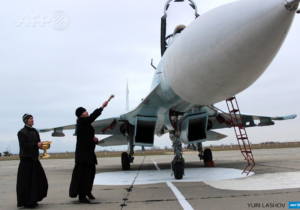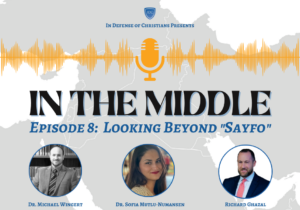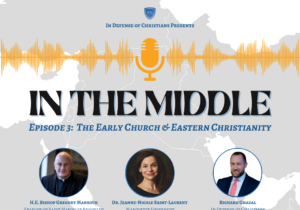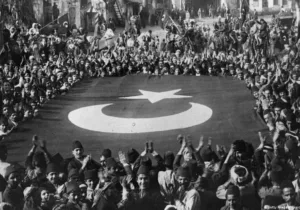My Twitter feed was especially schizophrenic this weekend as friends of mine split over the US-British-French missile attack on Bashar al-Assad’s extensive chemical weapons infrastructure in Syria. It was immediately clear to me that the division wasn’t along Christian/non-Christian or conservative/liberal lines, but focused instead on far deeper questions of American engagement abroad – the very questions that this journal was founded to deal with.
A quick survey of the two sides of the debate is a reminder that the broader debate about US intervention, especially Middle East intervention, is a difficult one that merits careful thinking. Hasty talking points and straw man arguments have no place here. The answers are far from obvious.
So what do the two sides say?
Opponents of intervention most commonly argue that Syria, like pretty much everything else in the Middle East, is not our fight. “Been there, done that,” says anti-intervention Twitter. “Why spend $200M on missiles when we can spend $50M to fix the pipe system in Flint, MI?” America has its own problems. Stopping the shenanigans of a wacko six thousand miles away is not one of them. When Assad goes down, ten more wackos will stand up to replace him. Leave it alone.
Added to this “America First” argument is a more sophisticated claim about US interests in the Middle East. In an era of increasing energy independence, we should carefully consider whether this part of the world matters to our national interests. Ukraine, North Korea, the South China Sea – these are kinds of the international flash points we should be focused on, not the hopelessly-enflamed backwaters of the Middle East. If we’re going to spend political capital somewhere, let’s make sure it counts.
Overshadowing much of this sentiment is the sense of America’s spectacular failure in Iraq. What did one trillion dollars, 5,000 dead, and over 30,000 casualties get us in our mad dash to unseat Saddam Hussein? Nothing but a dismal attempt to bring democracy to a part of the world that didn’t want it – the errand of a foolish nation. Fifteen years after the invasion, we see a country ravaged by ISIS, penetrated by Iran, and barely clinging to survival. Didn’t we learn anything from meddling in the affairs of other countries? Don’t we just make things worse?
Indeed, the argument against intervening in Syria rests on the premise that doing so will make things worse – much worse. As bad as he is, goes the argument, Assad is a secular moderate who is battling against the very Sunni forces that threaten America. Why would we want to undermine his government, much less topple it? Syria is one of the few Middle Eastern countries where Christians enjoy a modicum of safety and freedom, and Assad is the main reason for that. Weakening his government is tantamount to throwing the Syrian Christians to the wolves.
On the other side of the debate, the arguments are no less intense. People who come out in favor of the strikes start, first of all, with the fact that Assad has repeatedly used chemical weapons to murder his own population – that is, of course, not even mentioning the hundreds of thousands of others who have been killed by his regime since 2011. The U.S. is the most powerful country on earth: How can we stand by and watch as Assad slaughters innocent people?
Supporters of the strikes go beyond moral arguments, however, noting the need to reinforce the US-led liberal order that guarantees security for the world. Even though we can’t see it and sometimes forget it exists, this international order is still responsible for the relative peace that we all take for granted. What Assad is doing in Syria, murdering and displacing millions of people in flagrant disregard for the most basic norms of law among nations, undermines that order. As the guarantor of international security, we simply cannot allow these crimes to go unpunished.
Relatedly, supporters point out the need to block the expansive ambitions of the Islamic Republic of Iran. While more clever and subtle than their Sunni enemies, the Shi’ite ayatollahs of Iran are just as extreme and bloodthirsty and determined to take over the Middle East. Iran’s proxies in Lebanon and Iraq are responsible for spilling Israeli and American blood. Iranian paramilitary forces are destabilizing the region and threatening our allies. Allowing a build-up of Iranian power inside Syria will only further tilt the region toward all-out war.
Beyond Iran is the larger geopolitical threat presented by Russia. In a moment when Vladimir Putin appears to be succeeding on every front, menacing Eastern Europe, attacking American democracy, and feeding Middle Eastern chaos, it is imperative to our long-term interests that we draw a line in the sand. Giving way to Putin in Syria is telling him that his behavior is permissible. The US must show him that he cannot act with impunity. Russia must be checked.
Undergirding most arguments for intervention in Syria is the feeling that someone has to do something. This war, which has been borne most heavily by civilians, has gone on long enough. The dead are piling up. Millions of refugees have been pushed from their homes into strange countries around the world. For seven years we have stood by and watched, coming up with excuses to stay out of the fight. Whether compelled by morality or American interests, proponents of intervention feel that we cannot wait any longer.
Syria is one set-piece in a larger debate about US foreign policy after the Iraq War. Does the Middle East matter? What are the biggest threats to our future? Should America intervene to halt humanitarian disasters, or do principles of sovereignty and self-interest prevail?
Underlying these questions is an even larger question about what America can do, and should do, in the world. Two decades have passed since a definitive US foreign policy win; rarely have we felt so limited in our ability to influence world events. The Russians seem strong. The Chinese seem strong. The various Muslim forces arrayed against us seem strong. Are we strong? The felt consensus appears to be no, which explains why the American people believed that an outwardly tough and abrasive president could help steer the country through troubled times.
The debate about intervention in Syria is ultimately about the right use of American power. Christians need to be at the forefront of that debate, reminding the nation of its first principles, its commitments, and its responsibilities, thoughtfully engaging other arguments and making the case for a moral but realistic approach to the world.
It is obvious that our great wealth and power imply some level of duty. It can’t just be about our own enjoyment. What that duty is and how it is acted out are precisely the subjects that Providence was founded to debate.
—
Robert Nicholson is the executive director of The Philos Project and co-publisher of Providence







 Sponsor a student for Christianity & National Security 2024
Sponsor a student for Christianity & National Security 2024